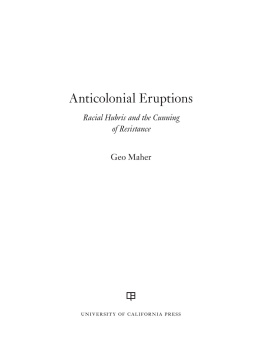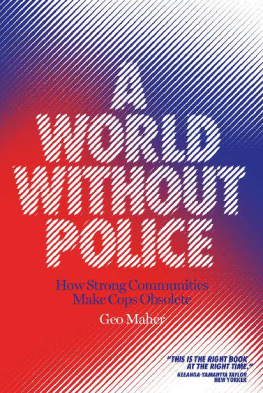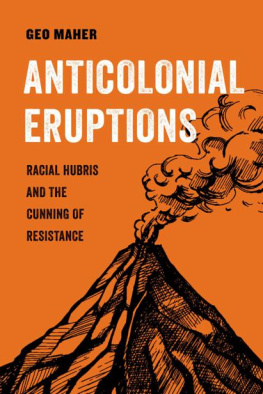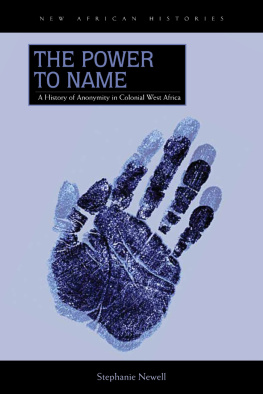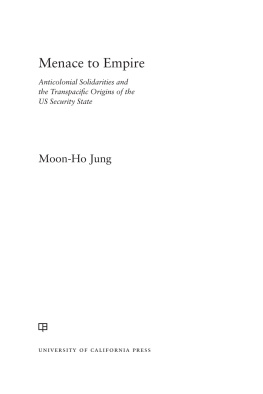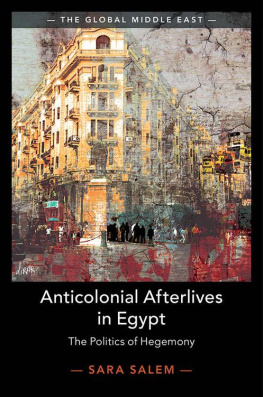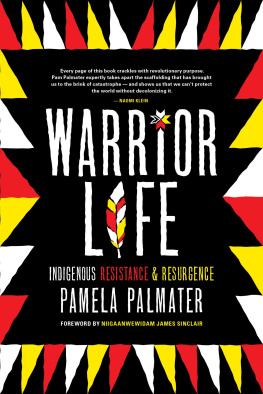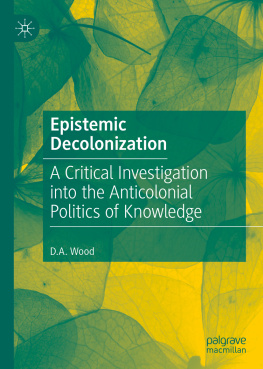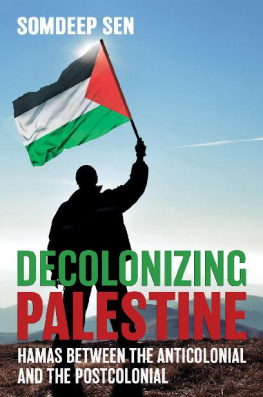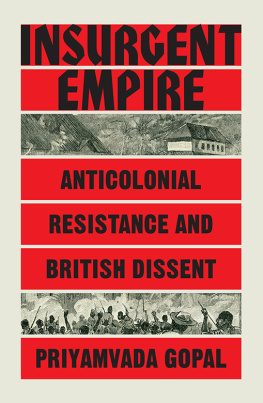Anticolonial Eruptions
PRAISE FOR ANTICOLONIAL ERUPTIONS
An urgent effort to make sense of the senseless, helping readers see the rationality behind the tepid liberal responses to the ideological maximalism of settler-colonial racism and violence.
Greg Grandin, author of The End of the Myth
Maher stitches together a lyrical text comprised of literary and political themes he has combed out of disparate geographies and times that will have you reading in a contemplative hurry. A welcome addition to a growing literature eager to see humanity overcome the worst of itself.
Noura Erakat, author of Justice for Some
This remarkably rich and diverse book not only offers valuable insights into the composition of our colonial present but also points to the long history of explosive thought and action that will eventually bring it crashing down: that of the colonized themselves.
Glen Coulthard, author of Red Skin, White Masks
Maher distills centuries of anticolonial resistance into this short but necessary primer on decolonial cunning. From Caracas to Minneapolis, Maher theorizes alongside and through the dreams of the oppressed.
Nick Estes, author of Our History Is the Future
While structural violence is omnipresent and ubiquitous, this book is a necessary reminder that it is not, however, inevitable. Geo Mahers latest book is a necessary telling of the subversive cunning of global rebellion, deftly illuminating the long history and contemporary path of revolution and resistance unfolding around us.
Harsha Walia, author of Border and Rule
AMERICAN STUDIES NOW: CRITICAL HISTORIES OF THE PRESENT
Edited by Lisa Duggan and Curtis Marez
Much of the most exciting contemporary work in American Studies refuses the distinction between politics and culture, focusing on historical cultures of power and protest on the one hand, or the political meanings and consequences of cultural practices, on the other. American Studies Now offers concise, accessible, authoritative books on significant political debates, personalities, and popular cultural phenomena quickly, while such teachable moments are at the forefront of public consciousness.
Anticolonial Eruptions
Racial Hubris and the Cunning of Resistance
Geo Maher

UNIVERSITY OF CALIFORNIA PRESS
University of California Press
Oakland, California
2022 by Geo Maher
Cataloging-in-Publication Data is on file at the Library of Congress.
ISBN 978-0-520-37935-0 (cloth : alk. paper)
ISBN 978-0-520-37936-7 (pbk. : alk. paper)
ISBN 978-0-520-97668-9 (ebook)
Manufactured in the United States of America
31 30 29 28 27 26 25 24 23 22
10 9 8 7 6 5 4 3 2 1
CONTENTS
OVERVIEW
VOLCANOES
Resistance by racialized and colonized people is often described as volcanic because it erupts from the underground of nonbeing
George Floyd Racism Haitian Revolution Frantz Fanon Nonbeing
CHAPTER 1. THE CUNNING OF DECOLONIZATION
Decolonial cunning takes advantage of the blindspots built into colonial racism and the second sight cultivated there to mount a shocking ambush
G.W.F. Hegel Slavery Nat Turner Colonialism Indigenous Resistance Anti-Blackness
CHAPTER 2. THE COLONIAL BLINDSPOT
By invisibilizing and dehumanizing their victims, slavery and colonialism fall prey to a self-imposed blindness
Benito Cereno Slave Rebellions Outside Agitators Slavemaster Ideology Deception
CHAPTER 3. THE SECOND SIGHT OF THE COLONIZED
Slaves, colonized people, and women have always taken advantage of the colonizers blindness to cultivate a strategic second sight
Invisibility W.E.B. Du Bois Tricksters Womens Resistance Black Spies Harriet Tubman
CHAPTER 4. THE DECOLONIAL AMBUSH
Rebellions against colonialism, slavery, and white supremacy can be understood as an ambush from the underground
Riots Police Brutality Underground Mudsill Zapatistas Venezuela
MOLES
The underground has always provided a launching pad for resistance and a space for building alternative worlds
Vietnam War Tunnels Walls Drones Migration Decolonization
Volcanoes
When George Floyd was murdered, Minneapolis erupted . This was the consensus, the lingua franca, of nearly every mainstream media outlet attempting to grapple with the street rebellions that burst forth unexpectedly in May 2020, spreading like wildfire across the US and beyond in the months that followed.
What is obvious to some is unthinkable to others, however. While those closest can often feel the rumbling, for many others volcanic metaphors bespeak shock and surprise, the sudden bursting forth of previously invisible forces. Something deeper, even subterranean, is at play, surging like so much molten lava, waiting to break the surface and unleash hell. To be clear: we are speaking of people, not nature, though sometimes the difference between the two is not so clear. Think of the proper name Katrina, or the perceptible weight of unnamable forces that impose themselves in a way that can only be felt as a force of nature, in part because they seek consciously to naturalize themselves.
For Ta-Nehisi Coates, this is the case with racism, depicted so often as the innocent daughter of Mother Nature that one is left to deplore the Middle Passage or the Trail of Tears the way one deplores an earthquake, a tornado, or any other phenomenon that can be cast as beyond the handiwork of men. But if racism seeks to portray itself as a force of nature, and indeed accomplishes its most brutal work through this naturalization, do we err dangerously by granting it what it wants, even in disastrous form?
For some critics, to compare racism to a natural disaster, as Coates does, runs the risk of accepting the truth of its categories, succumbing in the process to pessimism, fatalism, and despair. What happens, in other words, if we refuse to foreclose on the potency of natural disasters, calling white supremacys bluff? If racism is a force of nature, then those who resist it do so with the power of an irrepressibly seismic reaction beyond all possible moral condemnation.
Such disastrous beings can throw even the permanence of nature into chaos. Slaves planning an 1810 uprising in Virginia referred to the planned revolt as an earthquake, and one conspirator was overheard to remark that he was entitled to his freedom, and he would be damned, if he did not have it in a fortnight.
These questions resonate deafeningly today. If you could hardly blame those slaves who crept through the night to set plantation houses ablaze, striking terror into the heart of the American South, the same is true today as fire is again applied as a mechanical, indeed a natural response to police violence: to the Minneapolis Third Precinct building after George Floyds murder, to police vehicles nationwide in the weeks that followed, and to the Wendys where Rayshard Brooks was shot dead by Atlanta police less than a month later. So natural a response, in fact, that some 54 percent of Americans agreed that protesters were justified in burning down the Third Precinct. If it is a central pretension of Western modernity that nature is a vast prison that stands opposed to human liberation and freedom, then here we find something far different, turning such notions on their head.
From Native Hawaiians defending the literal volcano at Mauna Kea to those water defenders congregating to resist the Dakota Access pipeline at Standing Rock under the banner Water Is Life (Mni Wiconi), to speak of nature in this way evokes, not inert matter, but dynamic relation. This is far from fatalism or despair, and even with the judgment of the gods reversed, Coatess terms still apply: you cant subpoena this earthquake either, theres no slowing this whirlwind, and you certainly cant blame a volcano for erupting.

